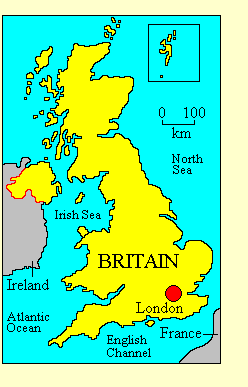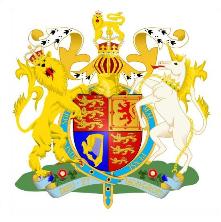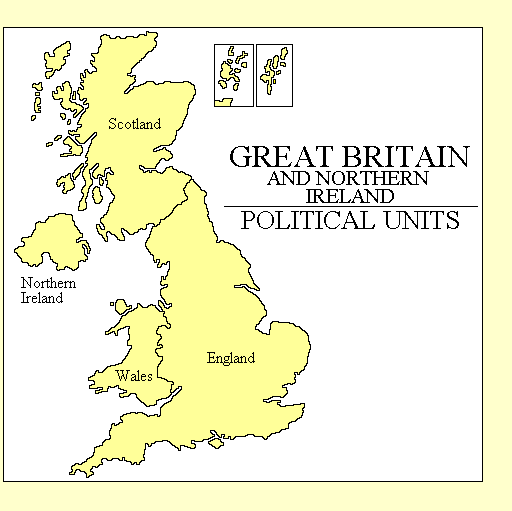

UNITED KINGDOM OF GREAT BRITAIN AND NORTHERN IRELAND
• Official name: United Kingdom of Great Britain and Northern Ireland. The
country is commonly called Britain or the UK.
• Location: Western Europe
• International organisations: Commonwealth of Nations, Council of Europe, European Union, North Atlantic Treaty
Organisation, Organisation for Economic Co-operation and Development, Organisation for Security and Co-operation in
Europe, United Nations, Western European Union, World Trade Organisation
• Borders: Ireland
• Coastline: Atlantic Ocean, English Channel, Irish Sea, North Sea
• Land area: 244,820 Km2
• Population: 61,100,000
• Annual GDP (PPP) per capita: US$35,200 (2009 CIA estimate). World ranking: 24
• Ethnicity: More than 90% of the population is of British stock. The Scots (9.6%) and the Welsh (2.0%)
consider themselves separate nationalities. About 4%
of the population is of Indian Subcontinental origin and about 2% are of Afro-Caribbean origin.
• Languages: English is the official language and is almost university understood.
Small numbers speak Welsh or Scots as their first language. Indian languages are
widely used in the immigrant communities.
• Religion: About 70% are at least nominally Christians, but religious practice has
declined radically. The Church of England is a state church, but there are
no disabilities for non-Anglicans. Moslem 3%, Hindu 1%, Sikh 1%, Jewish 0.5%.
• Form of government: In theory Britain is an absolute monarchy, in practice a
semi-federal parliamentary democracy. Britain is traditionally divided into counties, but these have been
abolished in Scotland, Wales and Northern Ireland, and also in some parts of England. Britain is now divided
into 468 local government units of various kinds, which are explained at the
Guide to UK local government.
Scotland,
Wales and
Northern Ireland have
their own legislatures, but
Britain is not a true federation. These legislatures operate under delegated authority
from the national legislature.

• Capital: London
• Constitution: Britain has no written constitution. Its system of government operates by convention,
reinforced in places by statute law. This system has operated since the Glorious Revolution of 1688.
Despite many proposals for constitutional reform, the system seems unlikely to change.
• Head of state:
Queen Elizabeth II came to
the throne on 6 February 1952. The
inheritance of the throne is governed by the Act of Succession of 1707.
• Head of government: The Prime Minister, appointed by the Queen and in theory
holding office at her pleasure. In practice the Prime Minister is leader of the largest party in the House
of Commons and accountable to it.
• Legislature: The Parliament is in
theory a bicameral
legislature, but since the upper house is unelected and decorative, the Parliament
is in practice
unicameral. The House of Commons has 659 members, elected for five-year terms from
single-member constituencies. The House of Lords, for centuries a hereditary chamber,
was reformed in 1999. It now has 675 members, of whom 557 are appointed by the
government (life peers)
and 118 are elected by the 1,115 members of the hereditary aristocracy. The House of Lords has only
limited powers to delay legislation which has passed the House of Commons.
• Electoral authority: National elections are conducted by the independent
Election Commission, which is part of the
Department of Constitutional Affairs.
• Freedom House 2011 rating: Political Rights 1, Civil Liberties 1
• Transparency International Corruption Index: 76% (20 of 178 countries rated)
• Reporters Without Borders Press Freedom 2010 Index: 94.0% (19 of 178 countries rated)
• Heritage Foundation Economic Freedom 2010 Index: 74.5% (16 of 179 countries rated)
Political history
Britain's unique constitutional arrangements are a product of
the country's pioneering role in the development of democratic government. Because of the
number of countries founded by British settlers (including the United States), because
Britain was the world's dominant economic and political power from the Napoleonic
wars to the First World War, and because Britain possessed the world's largest
colonial empire, British political institutions have been uniquely influential in
modern world history.

The Kingdom of England, which formed the core of the United Kingdom (being united with Wales
in the 16th century, Scotland in 1707 and Ireland in 1801), was an absolute monarchy,
but began to develop parliamentary institutions as early as the 13th century. The
English Revolution of the 1640s established that the King could not govern without
the consent of Parliament. The Glorious Revolution of 1688 established that the
Parliament could determine who could hold the throne and further limited the power
of the King.
The House of Commons itself remained essentially unchanged from mediaeval times
until 1832. It was composed partly of members representing the counties, elected by adult
males who met a property qualification, and partly of members representing boroughs,
elected by adult males on variety of franchises ranging from highly democratic to
oligarchic. Many large cities were not represented at all. Non-Anglicans were excluded
from Parliament until the 19th century.
A movement to reform this situation began in the late 18th century but was
retarded by the fear of radicalism which followed the American and French revolutions.
Between 1832 and 1918 a series of reform bills reformed both the
electorate and the distribution of seats. The first of these bills was fiercely resisted
but by the later 19th century the principles of democratic government were generally
accepted. By 1895 all adult males could vote. One consequence of this was the rise of
a nationalist movement in Ireland, leading
eventually to Irish independence in 1922.
Agitation for women's franchise began in the late 19th century but was
stoutly resisted. Women over 30 were given the vote in 1918 and women between 21 and
30 in 1928.
Unlike countries which developed democratic government through revolutions or
through struggles for independence, British democracy has evolved as a matter of
practice rather than theory. Britain has no written constitution, and in theory the
Queen is still an absolute monarch, enacting legislation after taking the advice of
her Parliament. In fact no monarch has refused to sign a bill
passed by the Parliament since Queen Anne in 1707.
Until the 20th century British politics were dominated by the
Conservative Party and the Liberal
Party, today called the Liberal Democrats.
These are the oldest political parties in the world, being descended from the Tory and
Whig parties respectively, with origins in the mid 17th century. The Conservatives
began as the party of royal and aristocratic resistance to change, but today are a
party of free-market conservatives. The Liberal Democrats are now a minor party of
the middle-class left.
The enfranchising of the working-class, in what was then the
world's greatest industrial power, led to the rise of the
Labour Party, which formed its first minority
government in 1923 and its first majority government in 1945. Labor has alternated
in office with the Conservatives since then. The shock of heavy defeats in 1983 and 1987
led Labour to abandon its commitment to socialism, and under Tony Blair (Prime
Minister 1997 to 2007) it became a party of the broad centre. The only other
parties of any significance are the Scottish National Party
and the Party of Wales.
In 2007 Blair was forced out of office as a result of party hostility to his support for the war in Iraq.
He was succeeded by Gordon Brown, who failed to recoup the Labour government's fortunes. The 2010 election saw Labour
defeated, but the Conservatives failed to win an overall majority. The Conservative leader
David Cameron formed a coalition government with the
Liberal Democrats.
Updated May 2010
|


